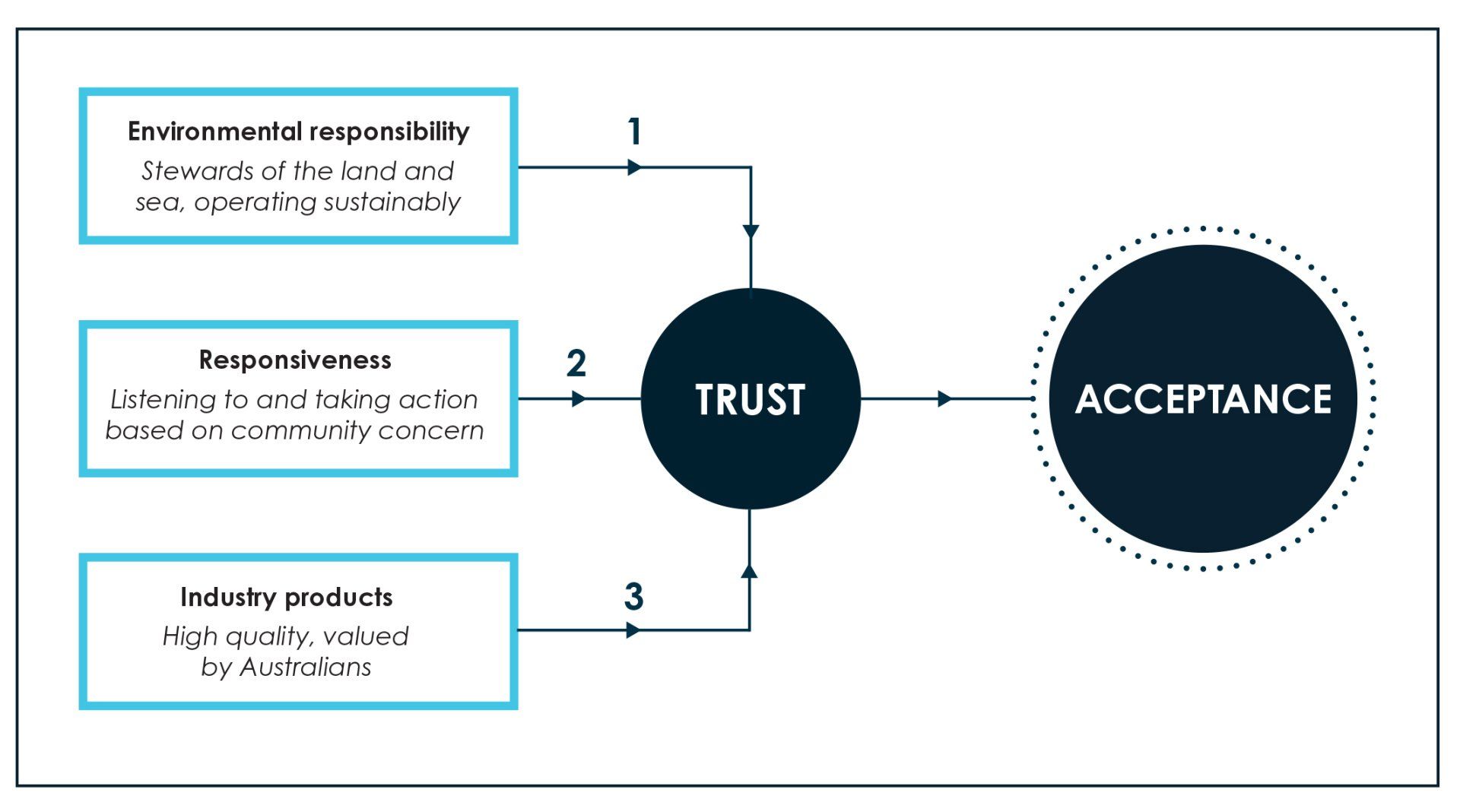1MG FlippingBooks
Rural Industries on Track with Trust: new research reveals key drivers, risks and opportunities
The Community Trust in Rural Industries Program is a partnership involving eleven Rural Research and Development Corporations, the National Farmers’ Federation and the NSW Department of Primary Industries. This timely capacity building initiative is designed to drive impactful, cohesive and consistent responses to the cross-sector community trust challenge.

INTRODUCTION
Australia’s farmers, fishers and foresters play an important role in our country. They work in a diverse number of industries – from beef, lamb, pork and livestock export to cotton, wood and grains, from fish and eggs to sugar, dairy and horticulture. These industries produce much of Australia’s food and textiles, which are grown or produced all around the country. Rural industries in Australia also have large and complex value chains, often shared across industries, that take raw materials and turn them into food and other products that are consumed domestically or exported.
The Community Trust in Rural Industries project is a program of collaborative research to understand the nature of the relationship between Australia’s rural industries and the Australian community. Importantly, this three-year research program demonstrates a commitment by Australia’s rural industries to engage directly with the community to guide industry activities and inform the thinking of their members. In Year One of this research, the program appointed research agency Voconiq who: (1) engaged with program funders to determine the goals and ambition of this work; (2) conducted interviews with a broad cross-section of industry participants and external stakeholders to determine key issues related to community trust in rural industries; (3) desktop research to understand how these issues are discussed and framed in the public conversation; and (4) completed a nationally representative survey of 6,461 Australians. A comprehensive process of rural industry engagement on these results has also taken place to support extension and outreach for effective use of these data insights by rural industry stakeholders.
This report provides an overview of the national survey results using data collected between the 2nd of December 2019 and 30th of January 2020.
OVERVIEW OF FINDINGS
The national survey aimed to achieve two broad goals: determine the main drivers of community trust in and acceptance of Australian rural industries, and to determine a baseline of Australian community attitudes toward a wide range of issues related to Australian rural industries.
DRIVERS OF TRUST AND ACCEPTANCE
This research found that community expectations, views and experiences drive trust in rural industries, which then drives acceptance of rural industries in Australia. Building community trust is therefore important for rural industries to maintain and grow community acceptance in Australia.
The main drivers of community trust in Australian rural industries were:
- Environmental responsibility – farmers, fishers and foresters acting as stewards of the land and sea, operating sustainably,
- Industry responsiveness – the extent to which industries listen to and change their practices in response to community concerns, and
- The value of rural industry products to the lives of Australians – the extent to which industry products contribute real value to the lives of community members.
Other factors that were important in contributing to trust in rural industries were faith in regulations to ensure industry accountability, knowledge of community members about the challenges rural industries face (e.g. drought), and how fairly the benefits of industry activity are distributed throughout community, especially with respect to regional areas.
BASELINE MEASURES OF TRUST DRIVERS
Australians were clear in their support for Australian rural industries, with most participants indicating moderate or strong levels of trust in these industries to act responsibly, and similarly high levels of acceptance of rural industries.
Australians indicated broad agreement that rural industries manage their role as environmental stewards of the land and sea effectively, although there was some concern about specific issues such as the impacts of runoff from rural industries on coastal environments, and complexity in the views of Australians about sustainable management of oceans and using appropriate amounts of water. There was very strong agreement, however, that environmental management is a shared responsibility across all Australian rural industries.
The national data showed that rural industries were seen to be broadly responsive to community concerns, but there was less agreement (and high levels of uncertainty) about the extent to which rural industries are prepared to change their practices in response to community concerns.
In fact, looking across all the issues explored in this national survey, Australians systematically indicated higher levels of uncertainty (i.e. choosing neutral or middle values on rating scales provided) on questions that related to environmental responsibility and industry responsiveness. This is a key challenge for rural industries as its current strong levels of community trust and acceptance are a product of community views on these issues.
There was very little uncertainty, however, about the value of rural industry products in the lives of Australians. The great majority of participants in the nationally representative survey of Australians agreed that the products of farmers, fishers and foresters play an important and central role in the lives of Australians.
ADDITIONAL INSIGHTS
Australians agree that rural industries in this country play an important economic role, creating significant employment in regional areas. Australians also indicated strong support for regional communities in general, and that strong regional communities are important for producing safe, high quality food and fibre products.
Australians strongly endorse animal welfare as a key issue and obligation for those industries that involve animals, and that food safety is both an area of strength for rural industries and an area where some industry practices prompt concern (e.g. the use of genetic modification, fertilisers and other chemicals).
“In this first year of research, the Community Trust in Rural Industries program has delivered a pathway to deeper community trust and acceptance for Australia’s rural industries, and baseline measures of Australian sentiment on these drivers of trust and other relevant issues. These data provide key insights for where and how Australian rural industries may engage the Australian community most effectively and highlighted those areas where there is work to be done in supporting a more reflexive, constructive relationship with all Australians.”
CONCLUSION
The Community Trust in Rural Industries program of work is providing key insights into the nature of the current relationship between the Australian public and Australia’s farmers, fishers and foresters, and providing a pathway to deeper trust and acceptance of these industries. A national survey of the Australian community has also provided a clear view of the challenges for Australia’s rural industries in achieving this goal.
KEY FINDINGS
A national survey of Australian attitudes has demonstrated that trust in and acceptance of Australia’s rural industries is strong. Community members view farmers, fishers and foresters as being important to Australia’s economy, identity and future. The products of these industries are highly valued, as are the communities in regional Australia that produce them.
Australians do not see farmers, fishers and foresters as just producers of important materials and goods for sale in Australia and overseas, however, but as “stewards of the land and sea”. This comes with a responsibility to use natural resources like water in sustainable ways, to ensure the safety of the people that work in these industries, and to ensure the welfare of animals that are so important in many of these rural industries.
Community members from across the country indicated strongly that there are issues that concern them about the practices of Australia’s rural industries, particularly around environmental impacts, the use of chemicals and genetic modification to enhance yields, and ensuring food is produced safely.
A deeper analysis of the national survey data revealed that not only are many of these issues important to Australians, they underpin the community’s trust in and acceptance of Australia’s rural industries. Path analysis showed that where community members feel that The Community Trust in Rural Industries program of work is providing key insights into the nature of the current relationship between the Australian public and Australia’s farmers, fishers and foresters, and providing a pathway to deeper trust and acceptance of these industries. A national survey of the Australian community has also provided a clear view of the challenges for Australia’s rural industries in achieving this goal. Australia’s rural industries are acting as “stewards of the land and sea, operating sustainably”, demonstrating responsiveness to community expectations and concerns, and continuing to produce materials and food that are important to Australian society, trust in rural industries will grow.
However, the reverse is also true: trust in Australia’s rural industries may be undermined, for example, by poor environmental stewardship, ignoring the concerns of community, and placing short term economic benefits ahead of longer-term value in the products of these industries. A strong level of agreement within the community that ‘environmental management is a shared responsibility across all Australian rural industries’ is a clear signal that Australians expect rural industries to work together to meet the high expectations that come with the trust of the Australian public.
The good news is that community trust in Australia’s rural industries is the product of its actions and behaviours: these industries have control over their own future. The challenge for these same industries is to work together to be accountable against these high community expectations, to live up to the esteem in which Australians hold farmers, fishers and foresters.
The Community Trust in Rural Industries Program is a jointly funded initiative of AgriFutures Australia, Australian Eggs, Australian Pork Limited, Cotton Research and Development Corporation, Dairy Australia, Fisheries Research and Development Corporation, Hort Innovation, Sugar Research Australia, Grains Research and Development Corporation, LiveCorp, Meat and Livestock Australia and the NSW Department of Primary Industries. National Farmers’ Federation is also a project partner and AgriFutures Australia is the managing agent. A selection of content has been sourced from the “Community Trust in Australia’s Rural Industries: A national survey 2020” report authored by Dr Kieren Moffat, CEO and Co-founder at Voconiq.














